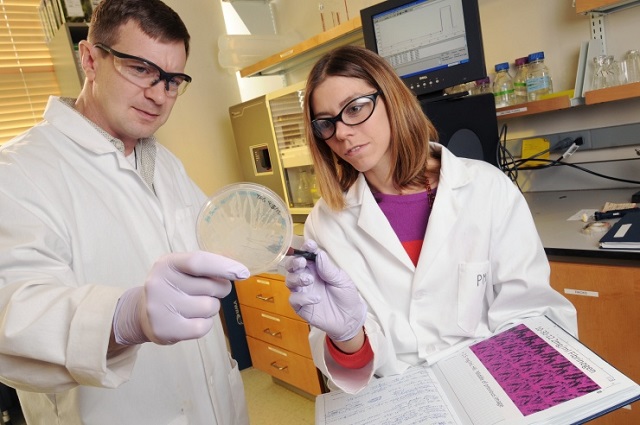 Associate Professor Tom Barker and Research Scientist Ashley Brown examine bacteria growing on a plate, part of a technique for evolving antibodies used in their research on platelet-like particles. (Georgia Tech Photo: Gary Meek)
Associate Professor Tom Barker and Research Scientist Ashley Brown examine bacteria growing on a plate, part of a technique for evolving antibodies used in their research on platelet-like particles. (Georgia Tech Photo: Gary Meek)
Researchers have discovered a unique class of synthetic particles that can enhance natural blood clotting in order to treat emergency traumatic injuries. This discovery is anticipated to provide doctors with a suitable alternative to natural platelet transfusion in cases of blood clotting disorders and surgical bleeding.
A research team from Emory University, Georgia Institute of Technology, Arizona State University and Children’s Healthcare of Atlanta carried their study out based on deformable and soft hydrogel materials and their study is published in the September 7 issue of the journal Nature Materials.
Testing carried out by the team indicated that the hydrogel particles helped to slow down the bleeding process and the particles are safe enough to be present in the blood stream. Testing of the particles has been done with human blood, although clinical tests have not been done in humans.
The blood stream comprises of fibrinogen proteins, which are fibrin precursors. When they receive signals from thrombin, they polymerize at the bleeding site. The synthetic particles are also activated by the same factor and hence are triggered only on initiation of the natural clotting process of the body.
Researchers used a technique known as molecular evolution to form that trigger. An antibody was developed that could fix itself to the hydrogel so that the particle form is changed when it counters thrombin-triggered fibrin. The antibody obtained displays a high and low affinity for the polymerized fibrin form and precursor material respectively.
It was found that when the hydrogel particles were added to platelet-depleted blood, clotting took place. Similarly the particles were tested on blood from infants who had gone through open heart surgery and also on hemophiliac patients and obtained favourable results. Before the particles can be used on humans, the USA FDA approval is mandatory and also human trials need to be conducted.